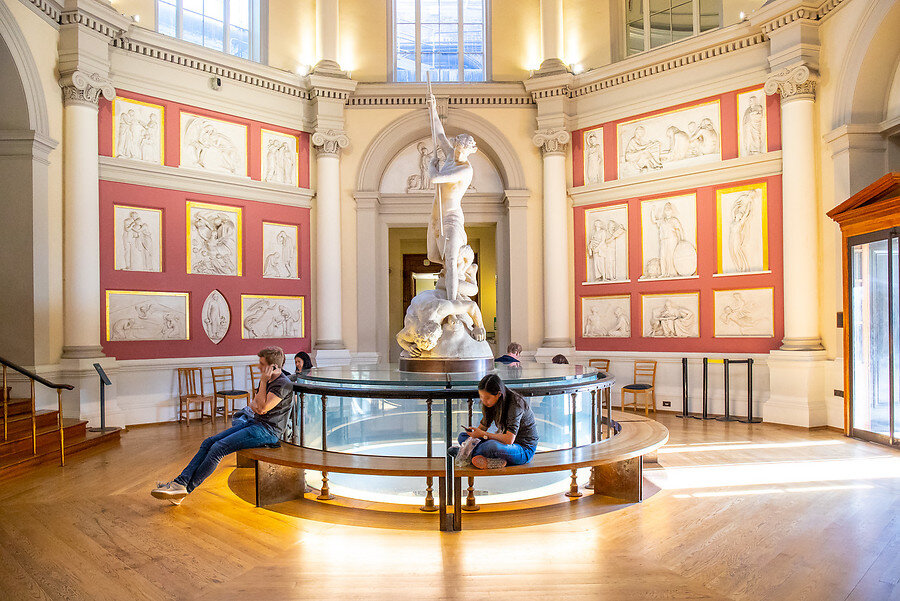UCL announces provisional response to new lockdown measures: on-campus activity unaffected
UCL President and Provost Michael Arthur has released a statement clarifying how the new Covid-19 restrictions will affect UCL activity, following the PM’s announcement on Saturday.
Source: UCL Imagestore
UCL President and Provost Michael Arthur has stated that UCL intends to remain open in a “Covid-secure way”, in line with Prime Minister Boris Johnson’s recommendation that schools and universities do not close during the upcoming lockdown. In his speech on Saturday, the PM encouraged all educational institutions to remain open, stating that “we cannot let this virus damage our children’s futures even more than it has already.”
Facilities on campus will not be affected by the new restrictions for the time being, which means that libraries, study spaces, halls of residence and catering facilities will all remain open provisionally. As the majority of courses are currently taught online, these will also not be affected by the lockdown, however, UCL will be reviewing the amount of face-to-face teaching that will be available. UCL laboratories will remain open and researchers will continue to be able to work onsite.
Although education has been announced as one of the exceptions to the new restrictions, it is currently unclear what this will mean for extra-curricular activities at the university. UCL has stated that it is working with the Students’ Union to ensure an “enhanced provision of social and physical activities on campus to support students, develop communities and friendships, and to reduce student isolation.”
UCL has previously come under fire for its treatment of outsourced staff, and the provost has claimed that UCL will be “reviewing urgently” what measures will be put into place to protect key workers at UCL who will continue working to keep campus open. An investigation by the Cheese Grater in April highlighted the increased risks that outsourced cleaning staff have faced during the coronavirus pandemic, and UCL eventually extended several guarantees to workers contracted through Axis, Sodexo, and Aramark to work during the crisis; these included UCL’s sick pay scheme and guaranteed pay for workers’ contracted hours, regardless of whether they had to work those hours during the closure of campus.
The Provost stressed that these measures are provisional and that more information will be released in the coming days as the university is “currently seeking more detailed clarification” on the government’s guidance for higher education institutions. UCL announced last week that terms two and three will likely remain online due to the current state of the pandemic in the UK.
The new lockdown measures were announced by the PM on October 31 in an attempt to slow rapid increase in coronavirus cases, as it was announced the same day that the total number of confirmed cases in the UK had surpassed the one million mark.
From November 5 until December 2, people in England will be required to stay at home as much as possible, apart from leaving for specific protected reasons. These include: education, work, shopping for food and essentials, exercise with one person from another household, medical reasons, escaping harm or injury and providing care for vulnerable people.
Non-essential shops and hospitality venues will be forced to close while supermarkets will still be allowed to operate. Pubs, bars and restaurants will only be allowed to offer takeaway and delivery services.
Households will not be allowed to meet outside apart from to exercise together on a one-to-one basis, but support bubbles will remain valid. A single adult living on their own or with children under the age of 18 can form a support bubble with a different household of any size.
While the second lockdown is due to end on December 2, both the Chancellor Rishi Sunak and Cabinet Office Minister Michael Gove have refused to rule out the possibility that it could be extended.
In his speech on Saturday, Johnson stressed that he felt optimistic that the situation would improve “by the spring” due to the “realistic hope” of a vaccine in the first quarter of 2021. He also announced a “steady but massive expansion” in the availability of “cheap, reliable and rapid turnaround tests” that will provide a result within 10 to 15 minutes, which the PM has claimed could be used to test entire towns or cities with the help of the army.

